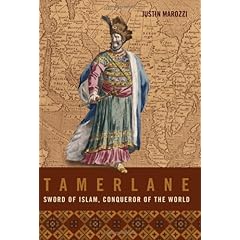
My history book club met this week to discuss Tamerlane: Sword of Islam, Conqueror of the World by Justin Marozzi.
Timur inherited the approach used by Ghengis Khan of building a military by splitting the tribes, and incorporated elements from his constantly enlarging empire. He kept his military busy; successful wars of conquest resulted in a flow of loot that enriched the survivors of his campaigns. He executed bureaucrats of his empire that he found wanting.
He seems to have been pragmatic, adopting religious positions to meet the political needs of the moment, while enjoying wine and a large number of wives denied the religious Muslim. He invited cities to submit, offering them the choice of ruinous donations to his treasury if they did so and retaliation of massive executions, rape, enslavement, and property destruction if they resisted and lost; those who resisted inevitably lost.
One question that came up was why Timur's empire did not last as had the Roman empire. Clearly the answer would be complicated. I would note that the question seemed to imply that a lasting empire is better than a transient one. It made me wonder whether the Tartars would have agreed, since their culture not too long previously had been nomadic disdaining urban centers. Would Timur have chosen to establish a smaller empire that lasted, had he preceived the choice, or would he have chosen to go down in history as a conqueror comparable to Alexander and Ghengis Khan in the extent of his conquests?
A second question was whether Timur was evil. It was noted, for example, that the perception that enslaving people as evil is clearly modern, an ethical judgment that become common only in the 19th century. In Timur's time, mass executions, rape and even the murder of little children might have been regarded differently by the average man, inured to killing animals and early death of his friends and family, than they do today. Still, if a "pragmatic" policy of deliberately inflicting such destruction on city after city is not "evil", then what good is the word?
No comments:
Post a Comment